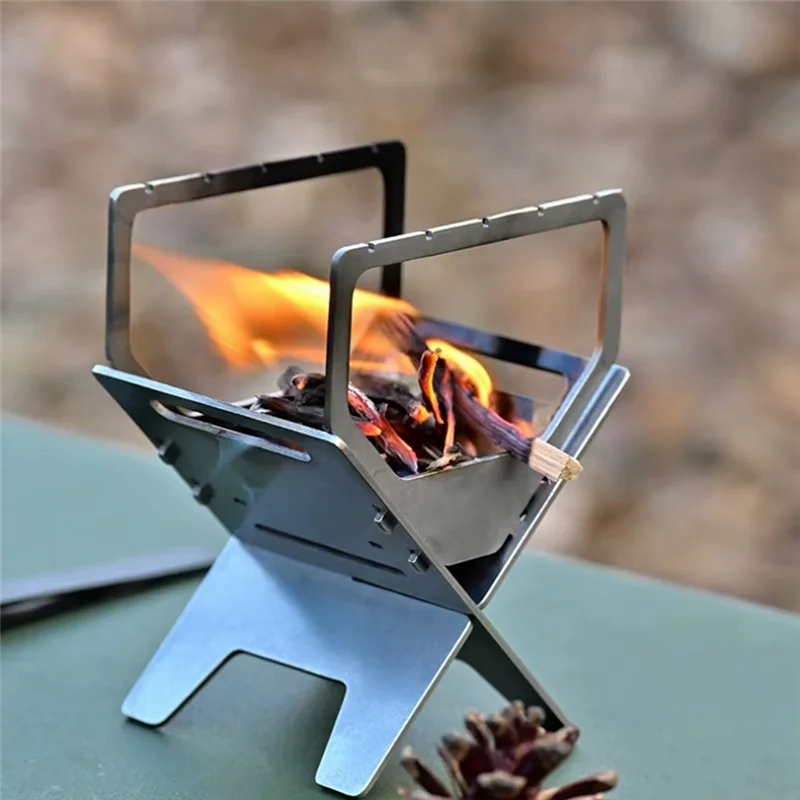
Titanium Stove vs. Aluminum Stove: A Quantitative Performance Comparison
Share
Material Science Behind Ultralight Camping Stoves
Choosing between a titanium stove and an aluminum stove ultimately comes down to a trade-off between performance and cost.
This guide provides a quantitative comparison to help you make an informed decision based on real-world data.
Quick Comparison Table
| Property | Titanium | Aluminum | Winner |
|---|---|---|---|
| Weight (900ml pot) | ~120g | ~180g | 🏆 Titanium |
| Thermal Conductivity | 21.9 W/m·K | 237 W/m·K | 🏆 Aluminum |
| Boil Time (500ml) | 3-4 min | 2-3 min | 🏆 Aluminum |
| Fuel Efficiency | Lower | Higher | 🏆 Aluminum |
| Durability | Excellent | Good | 🏆 Titanium |
| Corrosion Resistance | Superior | Moderate | 🏆 Titanium |
| Price Range | $40-$120 | $15-$50 | 🏆 Aluminum |
Detailed Performance Analysis
1. Weight Comparison
For a standard 900ml pot:
- Titanium: ~120g (33% lighter)
- Aluminum: ~180g
Impact: On a 7-day trek, this 60g difference can add up when combined with other gear choices.
2. Heat Distribution & Cooking Performance
Aluminum's Advantage:
- 10x better thermal conductivity (237 vs 21.9 W/m·K)
- More even heat distribution
- Reduced hot spots and burning
- 25-30% faster boiling times
Titanium's Challenge:
- Poor heat distribution creates hot spots
- Requires constant stirring for complex meals
- Best suited for simple boiling tasks
3. Fuel Efficiency Breakdown
| Scenario | Titanium | Aluminum |
|---|---|---|
| Fuel per 500ml boil | ~8-10g | ~6-8g |
| 7-day trip (3 boils/day) | 168-210g fuel | 126-168g fuel |
| Extra fuel needed | +42g | Baseline |
Note: The extra fuel weight partially offsets titanium's weight advantage on longer trips.
4. Durability & Longevity
Titainum Strengths
- Virtually indestructible
- No corrosion or oxidation
- Maintains performance for decades
- Scratch and dent resistant
Aluminum Considerations
- Can dent or deform under impact
- Anodized coating may wear over time
- Susceptible to corrosion in harsh conditions
- Still offers 5-10 years of reliable use
Decision Matrix: Which Stove Is Right for You?
✅ Choose Titanium If:
- You're an ultralight backpacker counting every gram
- You primarily boil water for freeze-dried meals
- You trek in extreme conditions (high altitude, harsh weather)
- You want a lifetime investment in gear
- Budget is less of a concern
- You value corrosion resistance for coastal/humid environments
✅ Choose Aluminum If:
- You cook actual meals (not just boiling water)
- You're budget-conscious or new to camping
- You camp with groups and need faster cooking
- Fuel efficiency matters for your trips
- You prioritize even heat distribution
- Weight savings aren't critical for your style of camping
Cost-Benefit Analysis
| Factor | Titanium | Aluminum |
|---|---|---|
| Initial Investment | $40-$120 | $15-$50 |
| Cost per Gram Saved | ~$0.50-$1.50/g | Baseline |
| Expected Lifespan | 20+ years | 5-10 years |
| Replacement Frequency | Rarely | 1-2 times |
Real-World Use Cases
Scenario 1: Weekend Warrior
Profile: 2-3 day trips, car camping or short backpacking
Recommendation: Aluminum
Reason: Cost-effective, faster cooking, weight difference negligible for short trips
Scenario 2: Thru-Hiker
Profile: Multi-week expeditions, every gram counts
Recommendation: Titanium
Reason: Weight savings compound over long distances, durability for extended use
Scenario 3: Alpine Mountaineer
Profile: High-altitude climbing, extreme conditions
Recommendation: Titanium
Reason: Superior performance in cold, reliable in harsh weather, corrosion-proof
Scenario 4: Family Camper
Profile: Group cooking, established campsites
Recommendation: Aluminum
Reason: Better for cooking meals, faster heating, budget-friendly for multiple pots
Key Takeaways
- Titanium excels in extreme environments and minimalist expeditions where every gram matters
- Aluminum remains the best value for casual or group camping where fast heating and low cost matter most
- The 60g weight savings of titanium is partially offset by increased fuel consumption on longer trips
- Consider your cooking style: boiling water only (titanium) vs. actual cooking (aluminum)
- Long-term investment: Titanium's durability may justify the higher upfront cost for serious adventurers
Final Verdict
There's no universal winner—the best choice depends on your specific needs. Titanium is the premium option for weight-conscious minimalists and extreme conditions, while aluminum offers unbeatable value and performance for most recreational campers. Consider your budget, trip duration, cooking habits, and environmental conditions before making your decision.
💬 What's your experience with titanium or aluminum stoves? Share your thoughts in the comments below!
